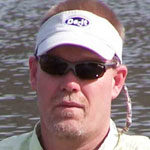
While the history of Lake Jocassee’s trophy bass fishery is bright, many fishermen, including Monty McGuffin, are concerned with two factors that threaten to diminish its luster. The first is environmental in nature, while the second is man-made.
“Water levels are in a constant state of fluctuation on Jocassee because of the water pump-back operations that go on there between Jocassee and Keowee and Jocassee and Bad Creek reservoirs,” said McGuffin, who believes that Duke Energy, the owner and operator of Lake Jocassee, does not cooperate with the SCDNR to maintain stable water levels at the peak of the bas spawn. He has seen the devastating effects of this first-hand.
“I’ve been out several times and seen a 5-, 6- and 7-pound female on a nest in three feet of water,” said McGuffin. “She won’t bite, so I’ll go back the next day to try her again, and the water level has dropped four feet overnight. Well, there goes that entire class of fish. Those eggs are gone, never to return.”
Although Ahle has no official capacity on Jocassee, he also sees the challenges of changing water levels.
“The water fluctuates a lot up there,” he said. “It’s hard to catch just the right time, and lately, it’s been getting more and more difficult. Probably because the water’s been down really low and the fish haven’t really been able to get up on the banks, so they’ve kind of had to make do with (other) woody structure and stuff like that for doing their spawning.”
McGuffin also pleads for anglers, many of whom have learned to fish Jocassee by watching his television show, to practice catch-and-release.
“I know some guys fish here every day through the spawn,” said McGuffin. “A lot of them release fish, but some don’t. They take a trophy home for the wall, or they want to move it to some other location. These fish take a long time to grow, and the best thing for the resource — and the anglers — is to take a picture. You can use that and a few measurements to get you a replica made, then put her back for others to enjoy.”


Be the first to comment